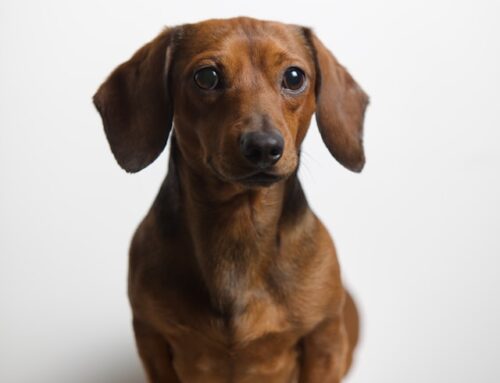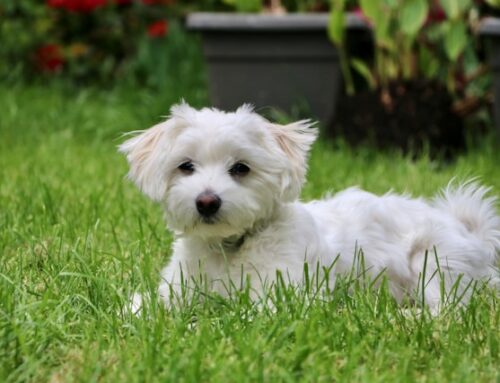Overview
Introduction: Why Does My Dog Lick Me So Much
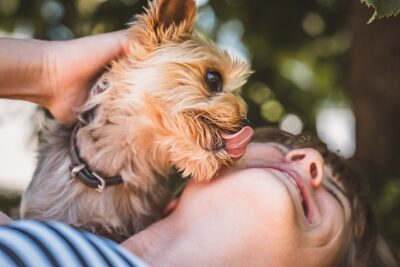
Imagine this: you're sitting on your favorite couch, and your furry friend comes over, showering you with slobbery kisses. It's cute, but have you ever wondered, "Why does my dog lick me so much?" In this article, we'll delve into the fascinating world of canine behavior, exploring the reasons behind this affectionate gesture.
Brief Overview of Dog Behavior
Dogs are more than just pets; they're companions who express themselves in various ways. Understanding their behavior is key to a harmonious relationship. Whether it's dogs licking to convey affection, as explored in detail in 'Why Does My Dog Lick Me So Much,' or exhibiting other behaviors, decoding their actions is crucial for dog owners.
Significance of Understanding Dog Licking
Before you dismiss those wet kisses, let's explore why dogs choose licking as a means of communication and connection. Unraveling the mystery behind dogs licking is not just about deciphering their actions; it's a vital aspect of the bond between dog owners and their furry friends.
If your dog licks your face or displays excessive licking behavior, it's their unique way of expressing emotions and building a connection with you. So, let's delve into the fascinating reasons explored in 'Why Does My Dog Lick Me So Much' and discover the significance of this behavior in the eyes of devoted dog owners.
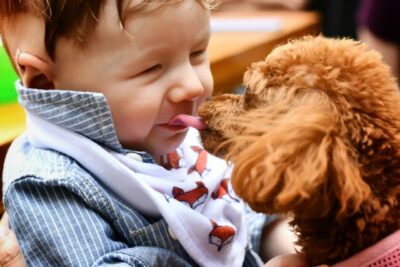
Canine Communication Through Licking
Instinctual Behavior
Dogs lick—it's ingrained in their instincts, a behavior dating back to their early days when communication was non-verbal. Your dog's licking is a way of conveying messages, a form of expression deeply rooted in their natural instincts.
Types of Licks and Their Meanings
Not all licks are the same. Whether it's a gentle lick or an enthusiastic one, each type carries a distinct meaning. Decode your dog's language to strengthen your bond and understand the nuanced ways in which dogs lick to communicate.
Puppyhood and Licking
Mother-Puppy Bonding
During puppyhood, licking plays a crucial role in the mother-puppy relationship. It fosters a sense of security and connection, showcasing how the act of licking is embedded in the early stages of a dog's life.
Mimicking Sibling Behavior
Young dogs are keen observers, mimicking the behaviors of their siblings. Excessive licking might be a learned behavior from their furry companions, emphasizing the social aspect of dogs licking.

Social and Emotional Connection
Expressing Affection
Your dog's affectionate licks, and if you've ever questioned 'why does my dog lick me so much,' go beyond mere gestures; they are a genuine expression of love. It's their version of a warm hug or a gentle pat, a way of showing affection that dog owners often cherish.
By understanding the emotional significance behind your dog's licking behavior, you can reciprocate their affection and strengthen the bond between you and your furry friend.
Licking as a Stress Reliever
In stressful situations, dogs turn to licking as a coping mechanism. This behavior isn't just about showing affection—it's a tool they use to self-soothe during times of anxiety or separation, highlighting the connection between licking and a dog's emotional well-being.
Dog's Health
Occasional Licking for Good Health
Many dogs engage in occasional licking of their paws or fur as a part of their grooming routine. This behavior, including if you've been wondering 'why does my dog lick me so much,' is often a sign of good hygiene, as dogs use their tongues to clean themselves and maintain their overall health.
While self-grooming is a natural and necessary part of a dog's routine, understanding the balance between regular grooming behaviors and excessive licking can help ensure your dog's well-being and happiness.
Taste Good: Why Dogs Lick?
Exploring the taste aspect, dogs may lick surfaces or objects because it tastes good to them. Understanding this aspect of their behavior adds a layer to the multifaceted reasons behind dogs licking.
Dog's Sense of Taste and Smell
A dog's sense of taste is closely linked to their sense of smell. Licking is not only a sensory experience for them but also a means of exploring and identifying scents, showcasing the intricate connection between their senses and licking behavior.
Many Dogs Show Affection Through Licking
For many dogs, showing affection involves licking. It's a natural instinct rooted in their ancestry as wild canids, where body language and licking were essential components of their social structure.
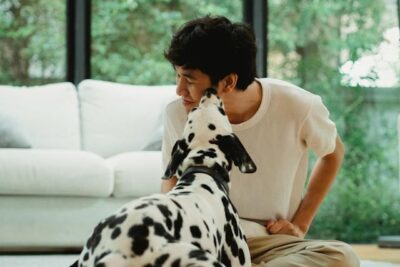
Problem Licking: Identifying Behavioral Issues
Good Behavior vs. Problem Licking
While occasional licking is a normal part of a dog's behavior, problem licking, especially if you're questioning 'why does my dog lick me so much,' can be indicative of underlying issues. Learn to distinguish between good behavior and signs of potential problems to ensure your dog's well-being.
By paying attention to the frequency and context of your dog's licking, you can gain valuable insights into their emotional and physical state, allowing you to address any concerns and foster a healthy and balanced relationship with your canine companion.
Compulsive Disorder and Licking
In some cases, excessive licking may be a sign of a compulsive disorder. Recognizing the difference between occasional grooming and compulsive behavior is crucial for addressing underlying causes.
Underlying Cause of Excessive Licking
Problematic licking can stem from various underlying causes, including stress, anxiety, or health issues. Understanding these root causes is essential for providing appropriate care and addressing behavioral concerns.
In essence, dogs lick for a myriad of reasons—from showing affection and grooming to addressing stress and health needs. Decoding this behavior requires attentiveness to their body language and an understanding of the diverse factors influencing their licking habits.
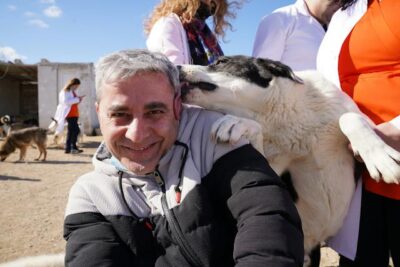
Taste and Scent Recognition
Salt and Mineral Attraction
Dogs are naturally drawn to the taste of salt and minerals found in your skin. Understanding this attraction provides insight into their licking behavior, as they seek out these enticing tastes through their licks.
Identifying Familiar Scents
Through the act of licking, dogs can identify and bond with familiar scents, creating a unique olfactory connection with their owners. This behavior goes beyond mere grooming; it's a way for them to establish and reinforce a comforting bond through scent recognition.
Health-Related Reasons
Dermatological Issues
Persistent licking may serve as an indication of underlying skin issues. It's essential to explore the connection between excessive licking and dermatological health, as this behavior can sometimes be a signal of an existing problem that needs attention.
Seeking Attention for Pain
In some cases, dogs may resort to licking as a way to draw attention to pain or discomfort they are experiencing. Being attentive to changes in their behavior and addressing any signs of pain promptly is crucial for their well-being.
Learned Behavior
Positive Reinforcement
Dogs are quick learners, and if they receive positive reinforcement for licking, it becomes a behavior they'll continue. Utilizing positive reinforcement in trick training or during moments of affection can shape their behavior positively.
Observing Human Reactions
Your reactions to licking play a significant role in influencing your dog's behavior. Learning how to guide their actions through consistent responses is key to shaping their behavior appropriately.
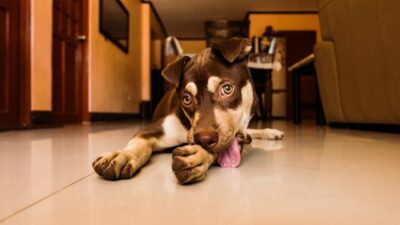
Attention-Seeking Behavior
Loneliness and Boredom
Lonely or bored dogs may resort to licking as a means of seeking attention. Discovering interactive alternatives to keep them engaged can alleviate this behavior, addressing the root cause of their attention-seeking actions.
Using Licking as a Playful Gesture
Licking can also be a playful act for dogs. Understanding the difference between playful licking and attention-seeking behavior is essential for interpreting their actions accurately.
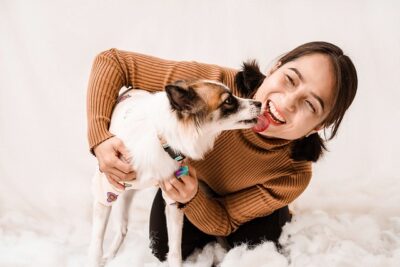
Dog's Excessive Licking Behavior
Obsessive Compulsive Disorder
If your dog exhibits excessive licking that seems compulsive, it could be a sign of obsessive-compulsive disorder. Recognizing this behavior and seeking advice from a vet immediately is crucial for addressing potential underlying issues.
Stop Licking: A Few Reasons
There are a few reasons why you may want to discourage excessive licking, including potential health concerns or simply personal preference. Learning how to gently train your dog to stop licking when needed is part of responsible pet ownership.
Dog Love: Tricks for Trick Training
Trick training is not only a fun way to engage with your dog but also a means to redirect their energy positively. Incorporating trick training into your routine can be an effective way to keep your dog mentally stimulated and discourage excessive licking.
Natural Bacteria and Enticing Smells
While dogs may be attracted to natural bacteria on your skin and enticing smells, it's essential to balance their behavior. Encourage positive interactions without allowing them to engage in excessive licking that may lead to hygiene concerns.
Want to Lick: Sign of Affection
For dogs, licking is often a sign of affection. Understanding that your dog may express love and comfort through licking is crucial for maintaining a strong emotional bond between you and your furry friend.
Taste Nice: How to Feel Calm
Certain tastes may trigger a calming effect in dogs. Recognizing the connection between tastes that appeal to your dog and their ability to feel calm through licking is part of understanding and responding to their needs.
Keep Your Dog: Showing Empathy
To keep your dog happy and healthy, showing empathy towards their natural behaviors, including licking, is important. Strike a balance between setting boundaries and allowing your dog to express themselves in ways that are comfortable for both of you.
Body Parts, Petting, and Licked
Dogs may lick certain body parts, including your hands or face, during petting. Understanding that this is a normal part of their communication and bonding process enhances the joy of interaction between you and your furry companion.
Food, Legs, and Licking
Licking may extend to various scenarios, including the exploration of enticing smells around food or the act of licking your legs. These behaviors are often rooted in a combination of natural instincts and learned behaviors, showcasing the complexity of your dog's communication.
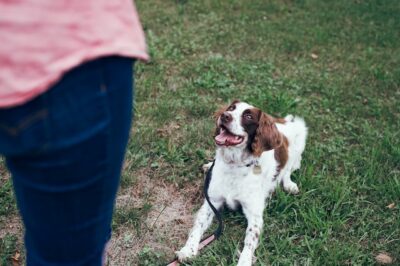
Setting Boundaries
Training Techniques for Licking
Establishing boundaries is crucial when it comes to managing your dog's licking behavior. Learn effective training techniques to control excessive licking, especially when it involves sensitive areas like your face or your dog's paws.
When to Be Concerned About Excessive Licking
Excessive licking might be a sign of an underlying issue, such as anxiety or discomfort. Recognize when it's time to consult a veterinarian, especially if your dog is licking persistently or if there are behavioral changes.
Environmental Factors
Weather and Temperature Effects
External factors like weather can influence your dog's licking behavior. Uncover the impact of environmental conditions on their tendency to lick, whether it's related to temperature changes or specific weather patterns.
Impact of Surroundings on Licking Behavior
Your dog's surroundings play a significant role in their behavior. Explore how your home environment affects their licking habits, considering factors like the presence of family members, excess energy, or anxiety triggers.
Misconceptions About Dog Licking
Dispelling Common Myths
Separate fact from fiction when it comes to dogs licking. Address common misconceptions about this behavior to better understand your furry friend and debunk any myths surrounding the act of licking.
Recognizing Normal Behavior
Distinguish between normal licking and behavior that requires attention. Be an informed and responsible pet owner, understanding that occasional licking is a natural part of canine communication, while excessive licking may indicate an issue.
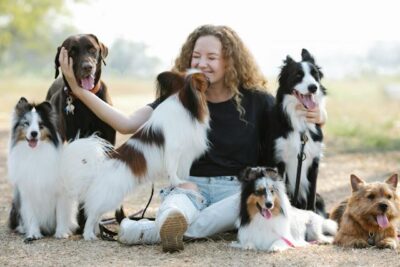
Licking and Human Health
Hygiene Considerations
While those kisses are adorable, there are hygiene considerations to keep in mind. Find a balance between affection and cleanliness, especially when your dog is licking your face or other body parts.
Potential Health Risks
Explore potential health risks associated with excessive licking, such as skin irritations or the transmission of bacteria. Prioritize your dog's well-being while still enjoying their affection, being mindful of any health concerns.
Grooming Behavior
Instinctual Grooming Habits
Licking is a part of a dog's grooming routine, instilled in them by their mother during their early days. Understand their instinctual grooming habits for a healthier coat and a well-maintained appearance.
Differentiating Between Grooming and Affectionate Licking
Distinguish between grooming and affectionate licking to better interpret your dog's actions. Know when your dog is caring for themselves or expressing love, fostering a deeper understanding of their behavior.
Addressing Excessive Licking
Identifying Behavioral Changes
If you've ever wondered, 'why does my dog lick me so much,' it's crucial to be vigilant for behavioral changes in your furry companion. Excessive licking can often be a sign of underlying issues, and early identification of these changes is essential to address the behavior before it becomes a concern.
By staying attentive to your dog's behavior and seeking to understand the reasons behind their frequent licking, you can take proactive steps to ensure their well-being and maintain a harmonious relationship.
Seeking Professional Guidance
When in doubt, consult a professional. Veterinarians and dog behaviorists can provide valuable insights and solutions, especially if your dog is licking excessively due to anxiety or other behavioral issues.
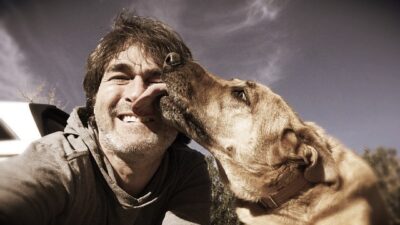
Owner-Dog Bond Strengthening
Positive Interaction Alternatives
Build a stronger bond with your furry companion through positive interactions. If you've been pondering the question 'why does my dog lick me so much,' consider redirecting their attention towards alternative behaviors that enhance your relationship.
Engage in play sessions or offer comforting cuddles as positive alternatives to excessive licking. By exploring these activities, you not only address the underlying need for connection but also create enjoyable moments that contribute to the well-being of both you and your canine friend.
Building a Stronger Connection
Understanding your dog's needs and behaviors fosters a deeper connection. Strengthen the bond with your loyal friend by addressing their emotional needs, whether it's through quality time, attention, or reassuring gestures during moments of anxiety or stress.
Conclusion: Why Does My Dog Lick Me So Much
In the intricate dance of dog behavior, licking takes center stage, forming a crucial part of the canine-human connection. Embrace this form of canine communication and respond with understanding, recognizing that your dog expresses love in their unique way.
If you find yourself wondering, 'why does my dog lick me so much,' it's essential to understand that excessive licking can be a multifaceted behavior, encompassing affection, communication, and even stress relief. By observing your dog's body language and context, you can gain insight into the specific reasons behind their affectionate licks and strengthen the bond between you and your furry companion.
Key Takeaways
- Decode the Language: Gain insight into the various types of licks and their meanings to better understand your dog's communication style.
- Health Awareness: Stay vigilant about potential health issues related to excessive licking, especially when it involves sensitive areas.
- Set Boundaries: Train your dog to respect boundaries for a harmonious coexistence, guiding their behavior through positive reinforcement.
Emphasizing Understanding Over Concern Why Does My Dog Lick Me So Much
Rather than dwelling on the question, "Why does my dog lick me so much?" shift your focus to the joyous moments of connection it brings. Embrace the mystery of your dog's affectionate gestures and revel in the unique bond you share.
Understanding that dogs lick not only as a sign of affection but also as a means of communication, especially in the context of separation anxiety, is crucial. This behavior is ingrained in them from their puppyhood, a time when licking played a vital role in bonding with their mother and siblings. As your pup grows, walking alongside them on their journey of behavior development strengthens the connection between you and your loyal companion. For more insightful tips on dog care, behavior, and other dog breeds check out our blog.
Frequently Asked Questions (FAQs): Why Does My Dog Lick Me So Much
- Why does my dog lick me so much?
- Dogs lick for various reasons, including expressing affection, communication, and as a natural behavior learned from puppyhood. It's a way for them to connect with their humans.
- Is it normal for my dog to lick my face excessively?
- Yes, licking your face is a common behavior for dogs. It's often a sign of love and affection, as well as a learned behavior from their early interactions with their mother and siblings.
- Do puppies lick more than adult dogs?
- Yes, puppies tend to lick more as it is a crucial part of their early socialization and bonding. They learn this behavior from their mother and use it to communicate with their littermates.
- Why does my dog lick other family members?
- Dogs lick not only to show affection but also as a way of bonding with the entire family. It's a social behavior that reinforces their connection with humans.
- Should I be concerned if my dog licks excessively during our walks?
- While occasional licking during walks is normal, excessive licking might indicate stress or anxiety. Observe their body language and consult with a veterinarian if you notice any signs of distress.
- Can dog licking be a sign of separation anxiety?
- Yes, excessive licking, especially when you're leaving or returning home, can be a sign of separation anxiety. It's their way of coping with the stress of being apart from their human.
- How can I discourage my dog from licking excessively?
- You can train your dog to reduce excessive licking through positive reinforcement. Reward good behavior and redirect their attention when they start licking excessively.
- Are there health concerns associated with dog licking?
- While normal licking is generally harmless, excessive licking may lead to skin irritation or transmission of bacteria. Keep an eye on your dog's overall health and consult with a vet if you have concerns.
- Why do dogs lick during walks?
- Dogs may lick during walks as a way to explore their surroundings, taste enticing smells, or communicate with other dogs through scent exchange. It's a natural behavior tied to their keen sense of smell.
- Can human responses to dog licking influence their behavior?
- Absolutely. Dogs are highly responsive to human reactions. If you consistently react positively to their licking, it may reinforce the behavior. Conversely, training and consistent responses can help guide their actions.

